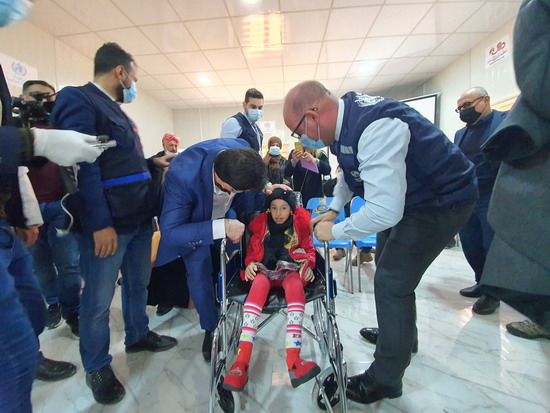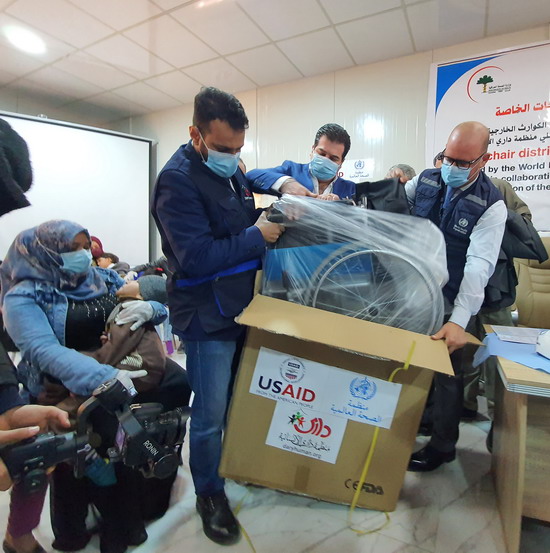 Mosul, Iraq, 24 February 2021 –The World Health Organization (WHO), in collaboration with Directorate of Health in Ninewa, distributed 150 wheelchairs to people with disabilities, including children under 14 years of age. Assistive technologies, such as wheelchairs, are essential to increasing an individual's ability to function independently and improve their well-being, and enable people with physical disabilities to carry out their daily activities and participate actively in their community.
Mosul, Iraq, 24 February 2021 –The World Health Organization (WHO), in collaboration with Directorate of Health in Ninewa, distributed 150 wheelchairs to people with disabilities, including children under 14 years of age. Assistive technologies, such as wheelchairs, are essential to increasing an individual's ability to function independently and improve their well-being, and enable people with physical disabilities to carry out their daily activities and participate actively in their community.
Since the liberation of Mosul, WHO has worked alongside the Ministry of Health to support 3 physical rehabilitation units in west Mosul, Talafar, and Sinjar districts. Through this partnership, quality services are provided to over 2000 people with special needs and of different age groups in the governorate.
“Access to assistive technologies is essential for people with special needs and the benefits of these devices have been increasingly recognized worldwide,” said Dr Ahmed Zouiten, WHO Representative and in Iraq. “Without these devices, these vulnerable people with particular needs may not be able to access education or be able to work,” he added.
“WHO renews its commitment to working with the Ministry of Health, partners and donors, to maintain comprehensive physical rehabilitation services, including an adequate provision of assistive technologies to women, men, and children with physical impairments in the most conflict-affected governorate of Ninewa and all over Iraq,” Dr Zouiten explained.
 Over the past 2 years, WHO, in collaboration with the national health authorities, expanded the range of specialized health services for people with physical disabilities to ensure easy access to physiotherapy and psychosocial support programmes, especially for those who have been internally displaced. In 2019, a survey was conducted to identify people with disabilities in and out of the displacement camps. The survey findings revealed the presence of 1300 new people with disabilities, of whom 95% were living in internally displaced population (IDP) camps, 58% were male, and 61% were in need of assistive devices and required wheelchairs.
Over the past 2 years, WHO, in collaboration with the national health authorities, expanded the range of specialized health services for people with physical disabilities to ensure easy access to physiotherapy and psychosocial support programmes, especially for those who have been internally displaced. In 2019, a survey was conducted to identify people with disabilities in and out of the displacement camps. The survey findings revealed the presence of 1300 new people with disabilities, of whom 95% were living in internally displaced population (IDP) camps, 58% were male, and 61% were in need of assistive devices and required wheelchairs.
“Seeing the smiles on the faces of the children while they climb on their first wheelchairs, fills our hearts with joy, and gives us the energy and the drive to continue supporting these initiatives,” concluded Dr Zouiten.
This initiative would not have been possible without the generous contribution from USAID's Bureau for Humanitarian Assistance. Together we made a step in the right direction to alleviate the suffering of people with disabilities in Ninewa governorate.
Related links
Improving access to specialized health services for people with physical disability in Iraq
26 January 2020
WHO support for prosthetic rehabilitation centre brings hope for patients with disabilities
12 March 2019
Italy supports physical and mental health services in Ninewa
Baghdad 18 December 2018
WHO supports access to assistive technologies for people with physical disabilities in Mosul
17 September 2018
For more information, please contact:
Ajyal Sultany
WHO Communications Officer
+964 7740 892 878
Pauline Ajello
WHO Communications Officer
+964 7818 774 262
Mohamed Qadir
WHO communications Officer
+964 7740 892 979


